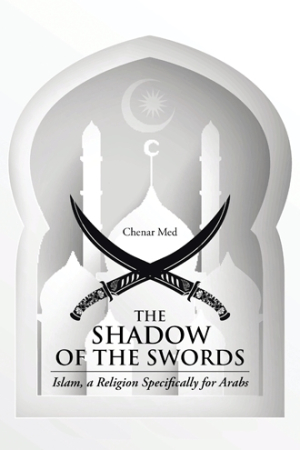
The Shadow of the Swords
Islam, a Religion Specifically for Arabs
Med highlights the complexities of the Arabic language and shows how even simple words may be interpreted in a bevy of ways.
Chenar Med’s The Shadow of the Swords brings a skeptic’s spirit to contemporary readings of the Quran, picking apart the holy book in an effort to highlight logical flaws in Islam. The book is a searing indictment of fundamentalism, though it often drifts into ideological territory.
Med prefaces his work by revealing that he grew up devoutly Muslim in Iraq, but began to ask questions that could not be answered by the Quran alone. This project aims to inspire similar questions in its readership, with the lofty and polarizing goal of determining “whether Islam is terrorism or a humanist religion.”
It becomes clear that Med’s opinions fall on the former side of the scale. Early chapters deconstruct notions of Muhammad as a perfect prophet, and of his words as divinely revealed. With modern ethical standards as his lens, Med paints a picture of a savvy man who, rather than taking directives from God, sought to attain great political power in Arab lands via military might and the manipulation of religious ideas.
Statements herein stand to render the author persona non grata in the company of Muslims. He claims that Muhammad was obsessed with sex to the point of abuse; that he faked pacifism until he became powerful, and then gave himself over to violence; and that he was racist, particularly against Jews. Furthering theories of political collusion, Med even introduces the provocative possibility that a Christian monarch aided in the birth of Islam strictly to hurt Judaism.
Such shocking contentions rely on conditional logic and often seem to warrant more pushback than they are afforded. Scientific misunderstandings are held up as cause enough to discount a prophet’s work, while seventh-century polygamy becomes sufficient reason to accuse Muhammad of sexual dysfunction; such arguments seem anachronistic at best. As a result, the odds of compelling Muslim audiences away from their tradition are lessened.
The book’s third chapter, which approaches the Quran from a textually critical, exegetical angle, contains some of Med’s most interesting work, and it stands to make the greatest inroads among inquisitive audiences. By highlighting the complexities of the Arabic language and showing how even simple words may be interpreted in a bevy of ways, Med conveys the tenuous nature of even “literal” textual readings. Chronology and the problem of textual supersession are also considered. Even those convinced that the Quran has divine origins will be given much to mull over here.
Still, Med’s readership must contend with some severe claims: that central stories are fictions, that Muhammad was cruel and calculating, that God does not exist. In the final pages, the book coaxes Muslims away from violence, but the work is so laden with heretical assertions that it stands little chance of persuading Muslim readers. The resultant ideological furor will inhibit the more academic work.
The Shadow of the Swords is an ambitious book that presents Islam’s origins from a strongly opinionated perspective.
Reviewed by
Michelle Anne Schingler
Disclosure: This article is not an endorsement, but a review. The publisher of this book provided free copies of the book and paid a small fee to have their book reviewed by a professional reviewer. Foreword Reviews and Clarion Reviews make no guarantee that the publisher will receive a positive review. Foreword Magazine, Inc. is disclosing this in accordance with the Federal Trade Commission’s 16 CFR, Part 255.
